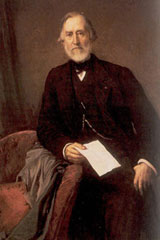Eugène Prévinaire
Eugène Prévinaire | |
|---|---|
 Eugène Prévinaire | |
| Born | Eugène Marie Ignace Prévinaire 18 October 1805 |
| Died | 2 June 1877 (aged 71) |
| Nationality | Belgian |
| Occupation(s) | politician, civil servant |
Eugène Marie Ignace Prévinaire (French pronunciation: [øʒɛn maʁi iɲas pʁevinɛʁ]; 18 October 1805 – 2 June 1877) was a Belgian businessman, liberal politician, civil servant, and from 1870 to 1877, governor of the National Bank of Belgium (NBB).
Born in Leuven on 18 October 1805, Prévinaire started his career as a civil servant, but after a few years he established a cotton mill in Huizingen in 1839.
Together with its first governor, François-Philippe de Haussy, he was one of the pioneers in establishing the NBB. Walthère Frère-Orban appointed him as secretary-director of the newly established bank in 1850, of which he became vice-governor in 1864 and governor in 1870.
During his first year as governor of the NBB, the Franco-Prussian War of 1870 broke out. In order to control the financial consequences of the war, Eugène Prévinaire took several measures such as doubling the discount rate and transferring the Belgian gold reserves to the fortified city of Antwerp.
After the war followed several years of economic prosperity, and the term of Eugène Prévinaire as governor of the NBB was extended by thirty years in 1872. On 20 June 1873 the law on cheques was published and banknotes became legal tender. He died in Brussels on 2 June 1877.
References
[edit]Sources
[edit]- De Paepe, Jean-Luc, Raindorf-Gérard, Christiane (ed.), Le Parlement Belge 1831-1894. Données Biographiques, Brussels, Académie Royale de Belgique, 1996, p. 472.
- Eugène Prévinaire
- Managing a foreign portfolio before the gold standard era: the National Bank of Belgium in the 1850s
